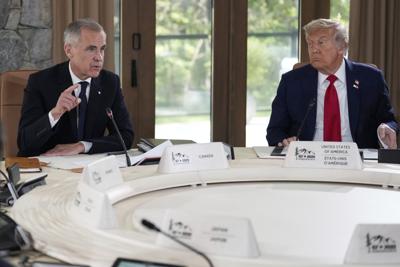Unfettered free trade is a delusion. The reality is that governments worldwide do not want to give up their policy making autonomy, which would be constrained by real free trade agreements. Nevertheless, freer trade is better than no trade.
With the clock ticking, how is Prime Minister Carney doing? This depends on what he considers would be a good trade deal for Canada. At this time, it is unclear what his objectives are. So let me suggest some. Following through on the principles set out in the Preamble of the USMCA should be the starting point. Canada should strive to get the U.S. to commit once more to eliminating most tariffs within a short time frame.
Another key goal in the original FTA was to reduce the risk of trade disputes. The idea was included in Chapter 19 of the USMCA, too. Assurance that there would be no future trade disputes of this type would be more than desirable. And so too would maintaining the value content and labour provisions in the USMCA, which included increasing levels of North American content in the production of autos and light trucks from 66 per cent in 2020 and to 75 per cent by 2023. And among the labour provisions was the requirement that wage rates in North American auto and parts production facilities would exceed $16 per hour and rise over time.
But there is no ÔÇťfree lunch.ÔÇŁ
Trade negotiations, like all negotiations, involve trade-offs and concessions. Where, exactly, are the stumbling blocks, and what might Canada have to sacrifice to get a ÔÇťgood dealÔÇŁ?
Given that the USMCA covers much of our trade with the U.S., it’s not clear what tariffs actually remain, other than steel and aluminum, which might be subject to prohibitive tariffs. Does Canada sacrifice these industries? Once upon a time the steel industry was Canadian-controlled. But that was once a upon a time.
Softwood lumber continues to be an irritant for the U.S. Perhaps, if First Nations take the lead in developing new projects, since the lumber is on their traditional lands, Canada could insist on implementing the following specific preamble to the USMCA to finally get softwood lumber off the table: ÔÇťRECOGNIZE the importance of increased engagement by Indigenous Peoples in trade and Investment.ÔÇŁ
Supply management for a number of agriculture products is definitely a major stumbling block. The USMCA included provisions for the gradual opening up of the Canadian market. For Canada, this is a political problem because the provisions are important to Quebec┬áÔÇö no party wants to lose votes in Quebec. From an economic perspective, Canadians would be better off if trade in all agriculture products was opened up completely.
The way provinces deal with trade has taken on more importance, particularly with the Ford government in Ontario removing U.S. wines and other alcohol products from LCBO stores, and his government threatening to impose an export tax on electricity. These ill-conceived measures violate the USMCA national treatment provisions. Carney has to educate the provincial leaders about the meaning and importance of national treatment. Subnational levels of government cannot take actions that reduce the potential benefits for companies involved in cross-border trade and investment. 
Protection of our cultural industries also might be an impediment to a deal. Canada was allowed to protect cultural industries in the USMCA. The US might try to change this now to provide more opportunities for US companies. This too is a political issue since most Canadians seem to be content to access foreign streaming services and social media platforms. 
Article 33.4 of the USMCA prohibited ÔÇťmanipulating exchange ratesÔÇŁ to ÔÇťgain an unfair competitive advantage.ÔÇŁ Periodic depreciation of the Canadian dollar most likely has made Canadian companies complacent and lazy, not more competitive
Finally, there are privacy laws. AI requires access to enormous amounts of data. The U.S., at the behest of the major tech companies, does not want strict privacy laws to impede the development of AI. These companies are lobbying Trump to put pressure on the EU and u.k. to greatly relax their privacy rules since they constrain access to personal data. Should Canada move in the direction of several European countries to protect the privacy of people, or do we follow the U.S. and allow companies, mostly foreign-controlled, to have free access?
Obviously, Canada will have to make concessions. But the longer it takes, the more Canada will lose economically over time. Investors do not like uncertainty, and more will invest in the U.S. to prevent getting caught in a future trade dispute.
Error! Sorry, there was an error processing your request.
There was a problem with the recaptcha. Please try again.
You may unsubscribe at any time. By signing up, you agree to our and . This site is protected by reCAPTCHA and the Google and apply.
Want more of the latest from us? Sign up for more at our newsletter page.































To join the conversation set a first and last name in your user profile.
Sign in or register for free to join the Conversation